Text
honestly the boundaries between friendship and romance don’t really matter that much like at all if everyone involved is ok with it
93K notes
·
View notes
Text

To be clear, I am throughly enjoying Thara Celehar, Witness for the Dead, but...uh...the overall vibes were a surprise.
168 notes
·
View notes
Text
I'm going to say something so controversial and so brave right now-
queer fandoms have gotta stop acting like the only path to queer happiness is through a relationship. It's reductive and exclusionary. It's bad enough in a fandom context and worse when it bleeds into real life. Queer joy comes in many different forms and that's what makes it beautiful. Take your ship goggles off for a second and expand your horizons
167 notes
·
View notes
Text
I'm currently reading Parzival by Wolfram Von Eschenbach, but I won't deny there's a little voice in my head telling me to just reread Vespertine. So I might do that.
2 notes
·
View notes
Text
So so so, back to my ongoing obsession with knights! I read the second Squire's Tale book yesterday. It was really good! I'm really enjoying this series a lot. Like I said before, I think Mr. Morris and I are on the same wavelength when it comes to Arthuriana. Sometimes I find books that I wish I could send to 10 year me, and this is one of them :)
2 notes
·
View notes
Text
Dang they really relegated Maia to the actual middle of nowhere huh 😭
sometimes books will be like "here's a map!" And it's like. With all the love and respect in my heart, I assure you I will not need that.
And other times it's like please I'm begging you please release a map I'll stare at it forever I promise
39 notes
·
View notes
Text
sometimes books will be like "here's a map!" And it's like. With all the love and respect in my heart, I assure you I will not need that.
And other times it's like please I'm begging you please release a map I'll stare at it forever I promise
#anyways miss katherine if you ever want to publish a map of the ethuveraz...#the goblin emperor#lucy reads
39 notes
·
View notes
Text
Thara: dear emperor you will not BELIEVE the shit that has happened
Maia: dear Celehar
Maia: what the fuck dude
108 notes
·
View notes
Text
Yes these books are great because they have a richly imagined world with wonderful characters from all different walks of life, and some slow-building political intrigue that looks like it might be about to kick into high gear BUT—
I do not have words for how invested I am in the Get Thara Celehar A Decent Coat Saga
102 notes
·
View notes
Text

Amalo's Witnesses for the Dead
200 notes
·
View notes
Text
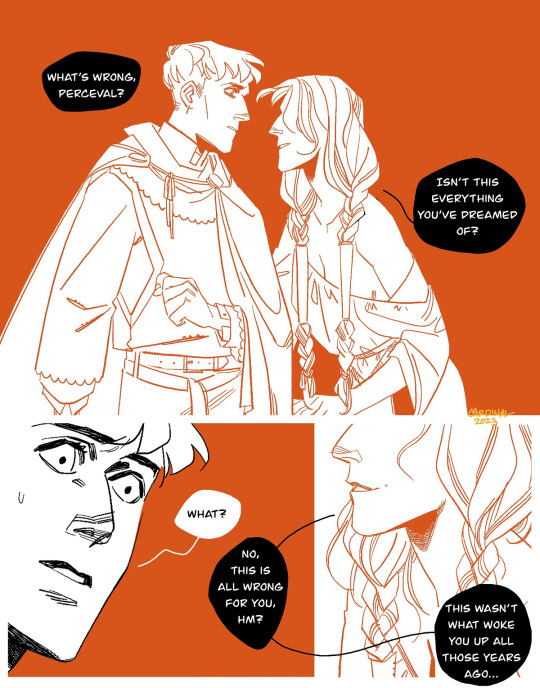

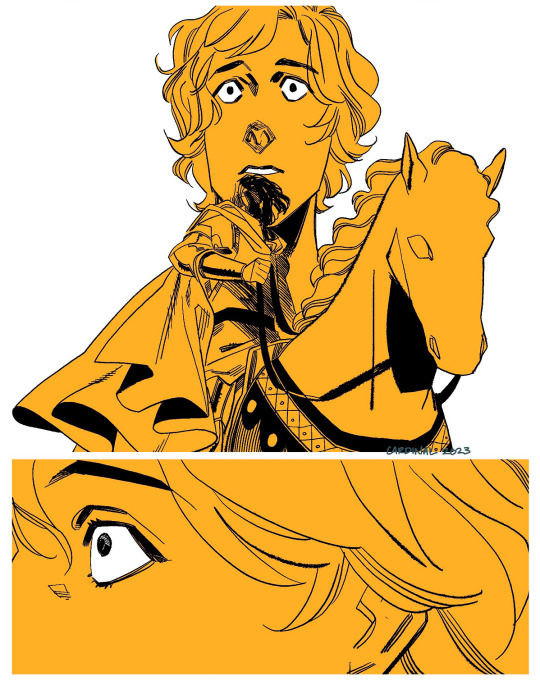
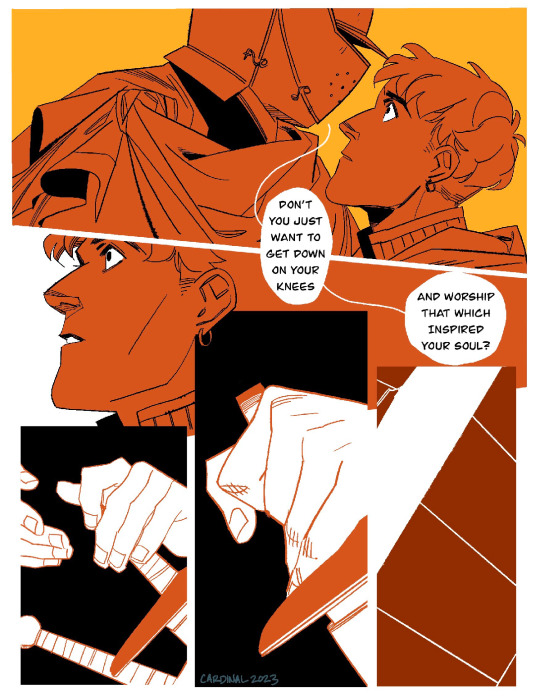
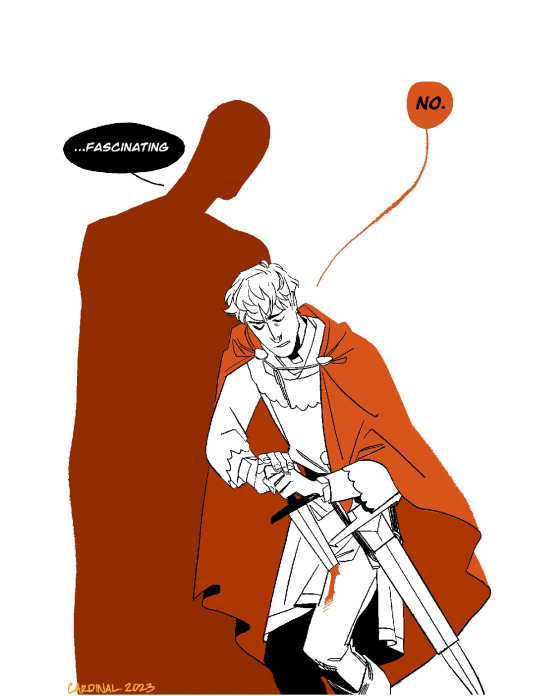
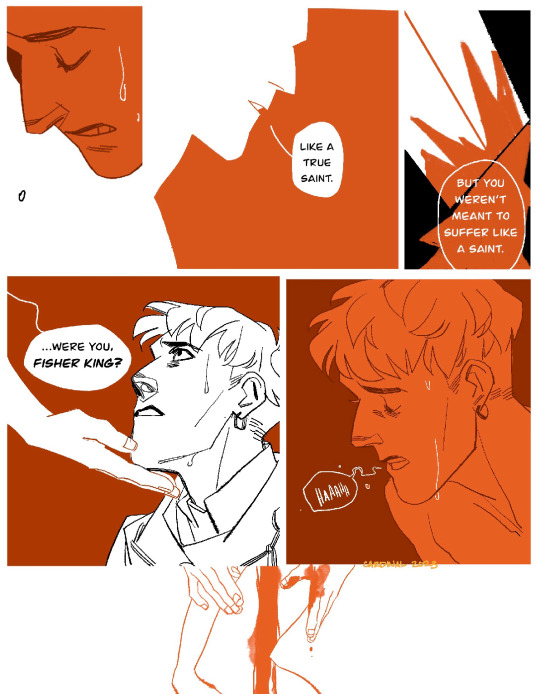
PERCEVAL THE UNHAPPY, THE MISERABLE, THE UNFORTUNATE, THE FISHER KING!

Perceval, de Troyes (trans. Burton Raffel)
ALRIGHT alright. so previously I did an illustration that explained the premise of all this, that it's inspired by the narrative choices that Bresson made in his film Lancelot du Lac etc
to dive in more into it (because this is something like derivative fiction. I'm putting concepts into a blender and seeing what comes out of it): the setting is haunted by the previously existing narratives that started cannibalizing each other until it regurgitates itself into the more well known narrative beats, and something else about the invasive rot of christianity and empire mythmaking into settings. it's an intertextual haunting, if you will! and this scene takes place during the grail quest narrative, but the temptation of Perceval plays out differently.
in both Chretien (and Wolfram's) Perceval narratives, what 'wakes' Perceval up (in more ways than one. desire and self actualization in one go!) is seeing knights, something his mother tried hard to keep him from. so instead of the temptation of lust & etc in the Morte narrative taking the form of a lady, it takes the form of a knight. the temptation to renounce one's faith to serve something else remains.
so Perceval still stabs himself, but instead of continuing on the grail quest in the shadow of Galahad, he becomes the narrative's Fisher King because his earlier state of being as a the grail quest hero is creeping back into his marrow. it was waiting for an opening, and stabbing yourself in the thigh is one hell of a parallel!!!
that wound isn't going to heal buddy, and the state of the setting will now be reflected on your body. sure hope that Arthur hasn't like. corrupted the justice of the land or anything. that sure would suck for your overall health.
all the red in this sequence is because in de Troyes' Perceval, Perceval takes the armor of the Red Knight and becomes known as the Knight in Red.
and now for the citations, which I will try to order in a way that makes sense!
Seeing Knights For The First Time
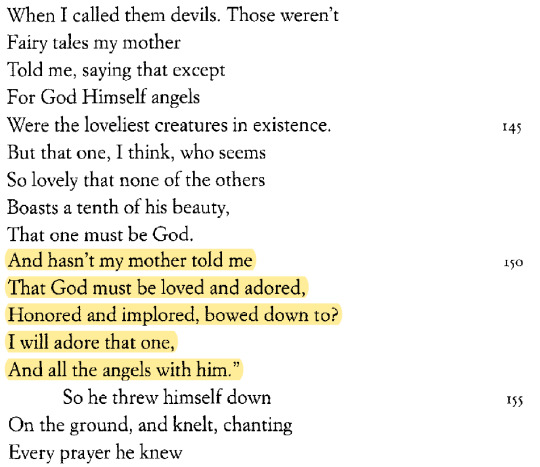
Perceval, de Troyes (trans. Burton Raffel)
The Temptation of Perceval
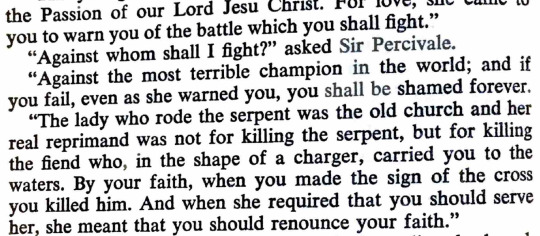

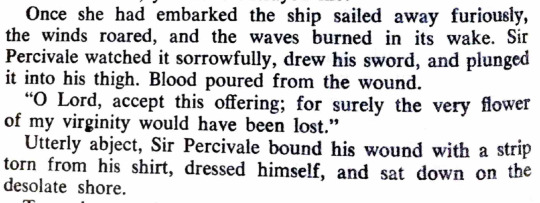
Le Morte Darthur, Mallory (modernized by Baines)
The Fisher King, and Perceval The Unfortunate
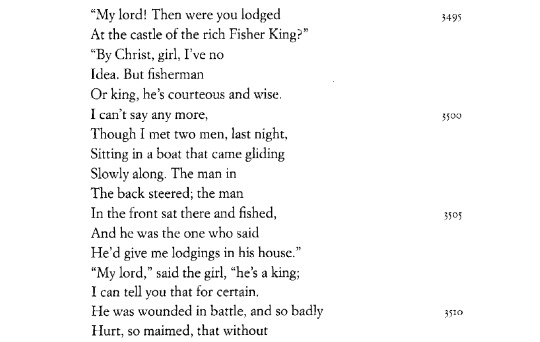
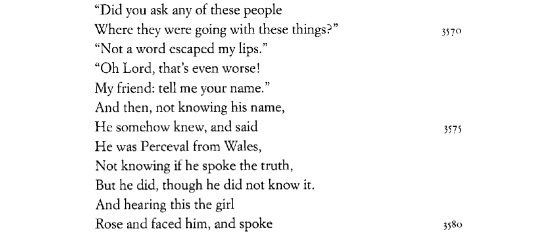
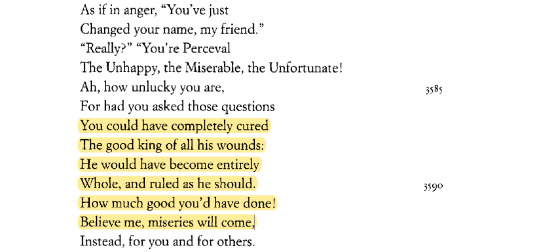
Perceval, de Troyes (trans. Burton Raffel)
On Perceval and Gender, etc.
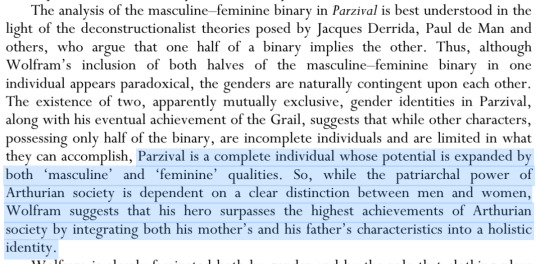

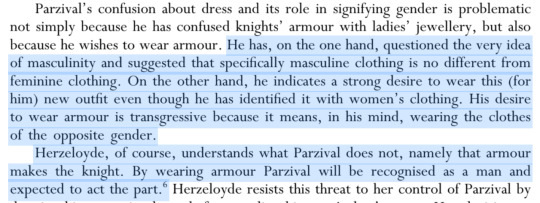
Clothes Make The Man: Parzival Dressed and Undressed, Michael D. Amey
On Wounds


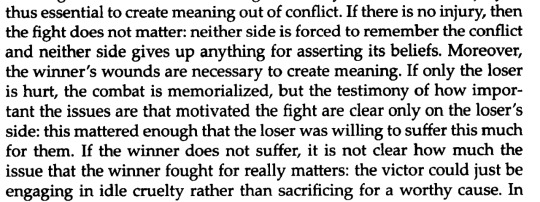
Wounded Masculinity: Injury and Gender in Sir Thomas Malory's Le Morte Darthur, Kenneth Hodges
The Red Knight

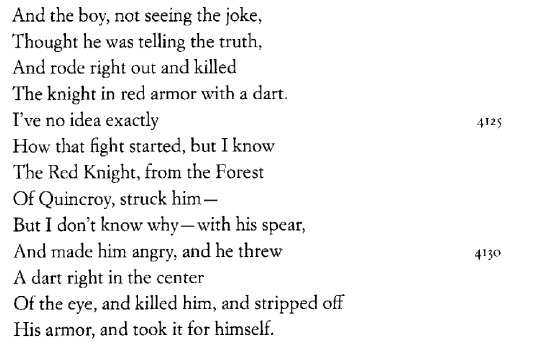
Perceval, de Troyes (trans. Burton Raffel)
On Arthur and the Corruption of Justice
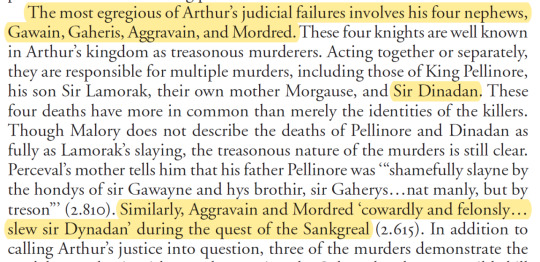




The Failure of Justice, the Failure of Arthur, L.K. Bedwell
4K notes
·
View notes
Text
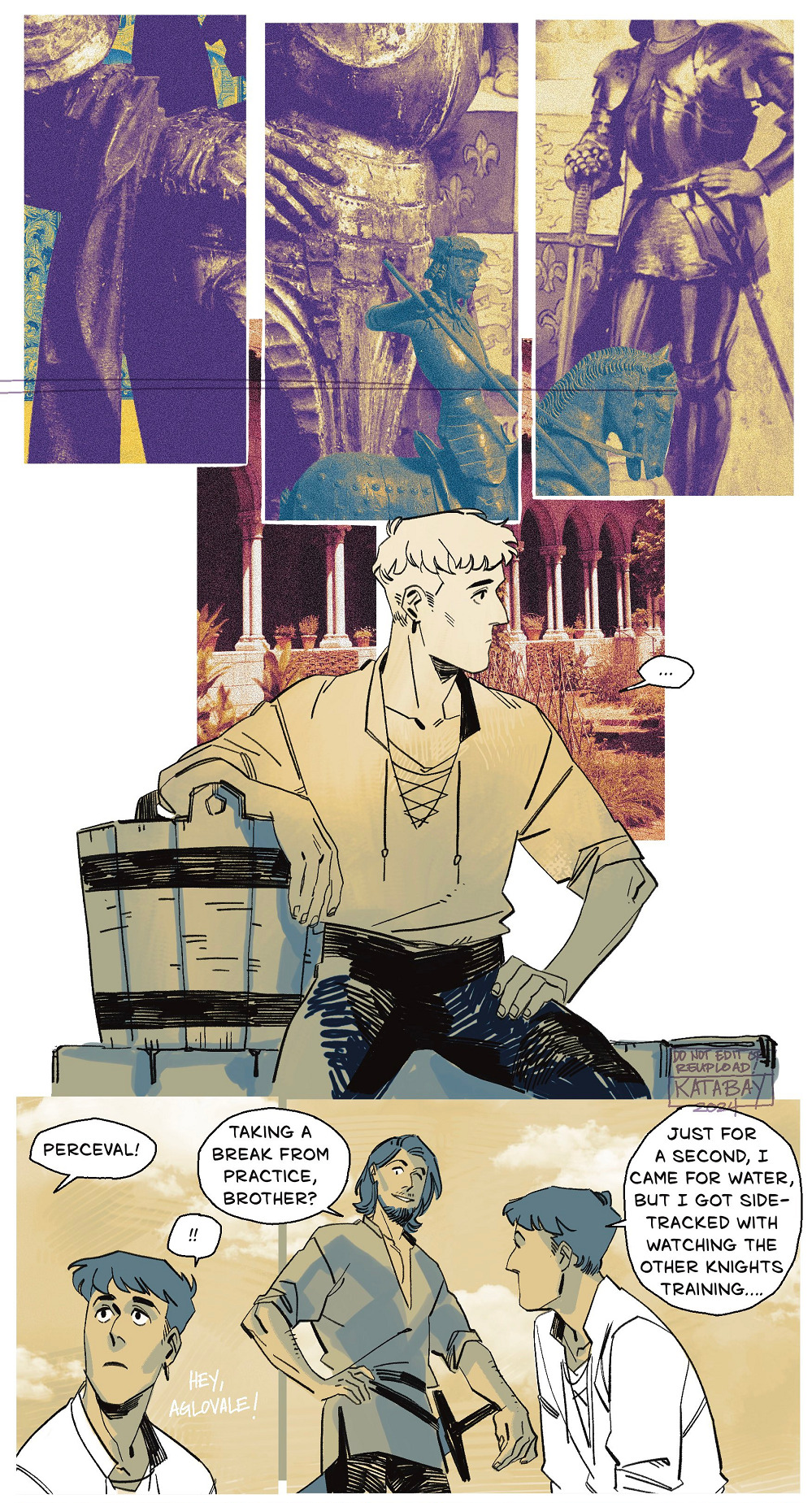


SUBTEXT
so I've focused in on Perceval and Bors before, and I've done Perceval and Gender (for more on this specifically, see: Clothes Make The Man: Parzival Dressed and Undressed, Michael D. Amey) and did a whole comic that leaned into some subtext™ on temptation, but actually let's throw out the subtext! let's bring Augustine into this!!
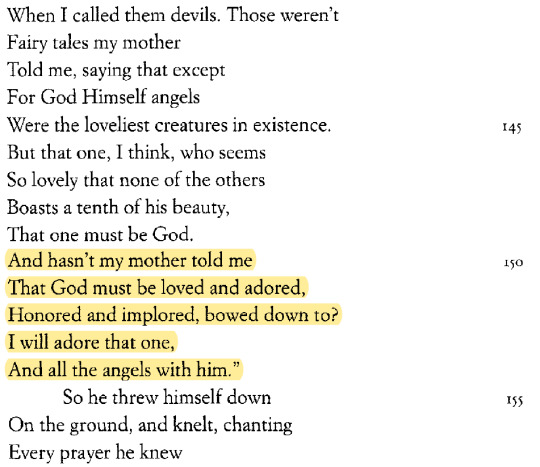
Perceval, de Troyes (trans. Burton Raffel)
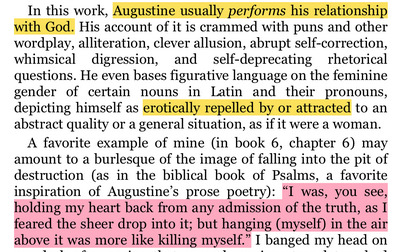
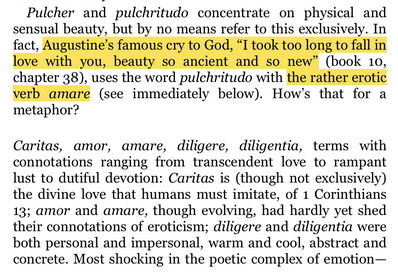

introduction to Confessions, Augustine (trans. Sarah Ruden)
so for perceval a knight is both the gender he wants to perform but also something that is expressly compared to god, and if god is a lover that seduces. well. does this not also apply to knights as well?

Homosexuality in the Renaissance: Behavior, Identity, and Artistic Expression, James M. Saslow
and while galahad might be the obvious choice, I think perceval's relationship with bors during the grail quest narrative is more interesting. it's not god that transforms perceval, it's the sight of knights for the first time. something in here specifically is incredibly intriguing to me, but there's a different text I need to finish reading to fully form some thoughts on it.

le Morte d’Arthur
and finally! tentatively. I think I might slowly start turning this idea I had a couple years back into a fully formed comic. we'll see! I had most of it blocked out, but halfway through reading augustine's confessions, I think was when perceval finally clicked for me as a character in a later narrative cycle setting. I think I might have to spend a lot of time doing some visual research first because my god I cannot consistently draw armor to save my life......back when I lived in new england, there was a museum with a wonderful medieval armor collection I could visit.....alas.........I will have to hit the books (literally, I have a collection of books on medieval armor but this is apparently the one thing I can't visualize properly in my imagination. save me, museum collections, you're my only hope)
⭐️ credits for the collage panels! (all open access or public domain, etc.)
-Saint George and the Dragon -Saint George and the Dragon (different one lmao) -Pages and Knights, Frontispiece for "The Man at Arms" -Cloisters
⭐ if you like my comics and have a couple bucks, I have a tip jar (ko-fi)!
⭐ and other places I'm at! bsky / pixiv / pillowfort /cohost / cara.app
803 notes
·
View notes
Text
The Tomb of Dragons, thoughts! Spoilers under the break:
I'm so glad I decided to read this in the comfort of my own home, where I can lose my mind in peace
Idk what I expected, but I didn't expect the special assignment to be so thoroughly bureaucratic. And there's religious politics mixed up in it. The worst kind
If I highlighted every conversation so far that has made me want to put this book down and cry, I'd have an alarming amount of passages highlighted already.
How many times is this poor guy gonna get kidnapped to deal with undead monsters?? He could have 2 nickels by now. And lord knows he needs the nickels
A REAL LIFE DRAGON?? Well I mean not alive but a DRAGON?!?! HELLO?!?!
A HUG! YES. HELL YEAH YES FINALLY
TWO HUGS GOD BLESS
"Would the Emperor rule in favor of dead dragons" are you kidding me this is Maia we're talking about of course he would. He's the kindest bestest boy in the whole world.
So far the plot of this book is not going in any direction I expected and I'm still not sure how I feel about that, but I am definitely having fun.
CSEVET
and Beshelar and Cala and MAIA
It's him it's my boy. I'm so proud of him. Augh look at him go. I'm crying. That's my son 🥲❤️
I think my favorite thing about this series is how detailed Miss Katherine is when it comes to religious world building. It's my favorite kind of world building, and she does it extremely well.
I was wondering how long it would be before an assassination attempt. I'm actually surprised it didn't happen sooner.
WAIT HEY WAIT. IÄNA IS AROSPEC MAYBE!? I'm not waiting for an answer, he is now. He is to me. Words don't express how overjoyed about this I am. Biggest hell yeah ever
Would love to see this part of the book from Captain Olgarezh's perspective, I just know it would have parallels with Costis in KoA. "How is this little guy getting into so much trouble all the time what the hell" y’know what I mean
I've said it before and I'll say it again, in fact I'll say it a thousand times- I love Maia so much. SO much.
Ah well. I really wish Thara could stay in Amalo, but I understand the idea that it isn't home, and that it's the people that matter, not the place. Still, it is sad.
That said I'm super duper pleased that it's a hopeful ending, if not outright happy, and that's all I really wanted from the series conclusion. Also I have to imagine the future contains a lot less getting randomly kidnapped now that captain Olgarezh is around, so that's a big win lol
So so so. What a lovely series. It's probably going to take me time and a few rereads to process the fact that it's over. I can say confidently right now, I enjoyed every installment and Katherine Addison is a wonderful, talented writer. I'm excited to read anything and everything she might choose to write next :3
12 notes
·
View notes
Text
Ok time to read The Tomb of Dragons. Sick and curled up in bed with some tea is probably the best way anyway. Better than having an unhinged reading experience in the break room at work, that's for sure
#lucy reads#i read most of QT in the break room at work and now i wouldn't be surprised if all my coworkers think i'm nuts.#i won't be repeating that mistake. i am going to be unhinged and unwell in the privacy of my own home. as is my right
2 notes
·
View notes
Photo



do you ever just get abruptly reminded about galehaut’s existence and suddenly want to start crying again
255 notes
·
View notes
Text

It’s March to Camelot prompt #2- Ruin.
My partner/tame writer is @corvidfeathers.
The March to Camelot challenge is hosted by @mortiscausa.
445 notes
·
View notes
Text

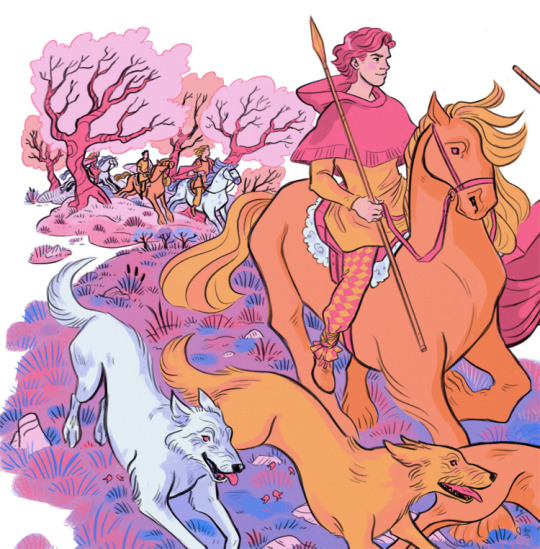

march to camelot 2025 #1: hunt
691 notes
·
View notes